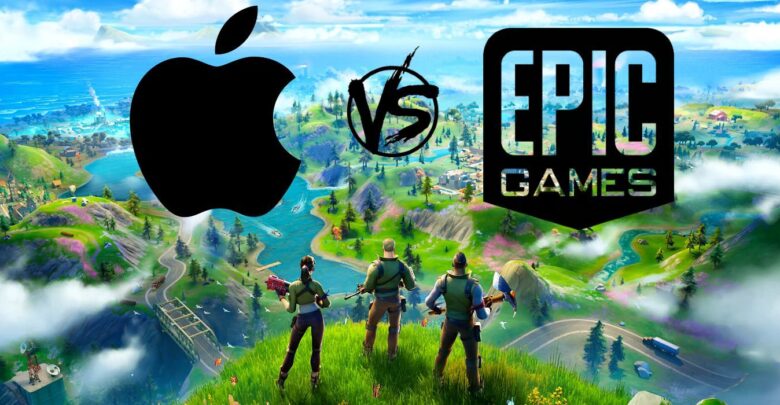Competition LawConcept to CommercialisationInnovation
Fortnite goes Rogue: Analyzing Epic’s Lawsuit against Google and Apple – II

The first part of this article can be accessed here.
Introduction
The viral legal battle between Epic and Apple has taken the world of law and technology by storm alike. Epic through its ad campaigns has successfully played the role of a revolutionary company trying to change the norms of the app distribution market for the better, the bare fact of Epic not seeking monetary remunerations from Apple has helped Epic fulfill their social goal to a very large extent. Apple on the other hand has managed to portray itself as a ‘bully’ by taking direct action against Epic by taking the extra step to ban Unreal Engine (a game developer software) which is used by several game developers from their iOS platforms. This meant that several third-party game developers were directly affected by the legal feud between the 2 companies, this included tech giants like Microsoft which has now expressed its written support to Epic with regards to their claim of injunctive relief.
- Epic’s partial injunctive relief
On August 24, the California District Court granted Epic a partial temporary restraining order against Apple. The order ruled against Apple’s harsh action on Epic’s Unreal Engine, however, the order also stated that Apple was under no legal obligation to host Fortnite on its App Store. This ruling primarily focused on maintaining the status quo and had a limited scope, the next hearing is dated on September 28.[i]
Apple’s action of banning Unreal Engine came like a wrecking ball to other developers who relied on Unreal Engine, a widely used standard game development tool. Epic’s plea for a preliminary injunction was publicly supported by Microsoft (which uses the Unreal Engine to develop its mobile game ‘Forza’). It was stated by Microsoft that they had an extremely long, enterprise-wide, and multi-layered license agreement with Unreal Engine and had invested a significant amount of time and resources for the same, therefore, claiming that Apple’s move would potentially harm other developers and companies.[ii]
Judge Rogers’ Reasoning for the Order
- Epic has the liberty to fix Fortnite’s alternate payment method
It was held by the court that Epic did indeed strategically plan out the breach of Apple’s agreement which drastically changed the status quo; therefore, the court could not identify equity which would establish a new status quo in favor of Epic. Judge Rogers held that Epic was free to honor it’s an agreement with Apple as claimed by them possessing the technology to do away with the ‘Hotfix’.
- ‘Irreparable Harm’ Absent for Epic viz Fortnite
The claim of ‘Irreparable harm’ made by Epic is ‘Self-Inflicted’ which is not considered as irreparable harm. It was also stated that Epic is yet to establish its irreparable harm as they can jump back to the status quo anytime they please as have been claimed by Apple and now by the court as well.
- Unreal Engine has a separate license
The developer license program of Unreal Engine and Epic’s deal with Apple is separate from the licensed program which Epic has with Apple regarding Fortnite i.e. They are separate contractual agreements. The court held that the Unreal Engine contractual agreement has not been breached in any regard.[iii]
“Epic Games and Apple are at liberty to litigate against each other, but their dispute should not create havoc to bystanders” – Judge Rogers
The return of Fortnite is eagerly awaited by its fans on the iOS platform, the court further stated that it understood the plight of the people during these pressing times and how virtual gaming creates a massive impact on connecting people. However, it was stated that the arguments advanced by Epic were not sufficient enough to overpower contractual obligations over the general public interest. The court had a different opinion concerning the Unreal Engine. It was stated that the Unreal Engine platform and the gaming industry as a whole would have recorded significant damage, including third-party developers. It further points out that no agreement breach has taken place and that the need for innovation and creativity avenues must be increased rather than eliminating them[iv].
- Epic’s files for a preliminary injunction
A preliminary Injunction brief was filed on August 4 by Epic Games urging Apple to restore Fortnite on their App Store. The plea for Injunction was filed in the United States District Court of California to stop Apple from mistreating Epic for standing up against apple.
Epic has come up with a set of new and more convincing arguments after their initial plea for an injunction was partially rejected by the court.[v]
Epic is likely to win the Antitrust case
Epic claims that Apple has a monopoly over the app distribution market via the Apple App Store. It is further claimed by Epic that the monopolistic powers are further magnified by a naked tie by extending their overarching control of the In-App payments.[vi]
Does Apple have a Monopoly in the iOS App Distribution Market?
In Eastman Kodak co. v. Image Technical Services Inc., it was held that it is imperative for the manufacturer to not have complete power over the manufacturing market, however, the manufacturer might possess an overbearing monopoly over the secondary aftermarket for eg. repairs, spare parts, etc. Epic uses the landmark judgment stated above to make three key claims on Apple spreading its monopolistic powers to the app distribution market (which must be considered as an aftermarket).[vii]
- The app distribution market on iOS is directly linked with the primary market, therefore making it an aftermarket (which can be considered as a derivative from the primary market)
- The claims on the anti-competitive nature of Apple are strictly revered to their app distributing aftermarket and not their primary market of selling iPhones, iPads, etc. In Newcal Industries, Inc. v. IKON office solutions, it was held that “illegal restraints of trade and illegal monopolization relate only to the aftermarkets”.[viii]
- The market powers in the aftermarket cannot be achieved through the contractual restraints it sets for its consumers in the primary market. Epic claims that the customers after buying an iOS device do not necessarily agree to restrict themselves from exploring other app distribution platforms, therefore, Apple’s action of imposing restrictions on its consumers should be considered as anti-competitive.[ix]
Epic will be irreparably harmed
Epic claims that iOS as a platform catered to the maximum number of Fortnite players. It further stated that 116 million Fortnite players have registered from their respective iOS devices, which is a third of the total number of Fortnite users (350 million). Over 63% of the users of Fortnite on iOS devices have claimed to use Fortnite exclusively on their iOS devices, therefore, indicating that the iOS device is the only way to access the said application. Epic claims that the damage is irreparable as the users they lost are the users they may never get back; it further explains the community of gaming regarding Fortnite being “Torn Apart”.[x]
Apple’s possible reply
Apple would claim that the iOS products are sold as one single product which includes everything that Apple offers i.e. Apple does not give its consumers an option to choose a different operating software while selling their products. It could be further added that the consumers are well aware of the ‘restrictions’ that the iOS ecosystem offers indicating the consumers specifically paying for the said ‘restrictions. In the instant case, Epic is not a consumer of the iPhones, but the consumers of the iOS ecosystem in a broad sense. (as Epic uses their platform as an app distribution market)
Apple would also use their argument that Epic has created a sense of doom all by themselves and can easily get out of this situation by honoring their terms of the contract.
Apple accused of unfair treatment
In the wake of a historic legal battle between Apple and Epic, some of the exclusive deals cracked by Apple with other big companies have raised many eyebrows. Apple has been accused of partial/unfair treatment by many pundits for their recent deal with Amazon which would bypass Apple’s payment method allowing Amazon to use its payment system. This would essentially mean that Amazon would be excused from Apple’s strict 30% cut for the in-app purchases. When scrutinized, Apple claimed that there existed an “established” program for “premium’ video apps subscriptions which now would include Amazon Prime, allowing them to use their separate payment method.[xi] Apple further added that the said program was already in place for Altice One and Canal+. However, many pundits were flabbergasted by Apple’s statement and claimed that the said program was virtually unheard of.[xii]
The main point of contention pertaining to the instant case boils down to Apple ‘bending’ its rules for a big company like Amazon to expand its customer base in the Apple TV ecosystem. Amazon in the said case would benefit from not paying the 30% fee and Apple would benefit from gaining more customers. This point is further strengthened by the fact that ‘Kindle’ (an application for reading books online) has remained the same i.e. the consumers are not provided with an option to buy online books from the application itself and Amazon isn’t allowed to direct the said consumers to the Amazon store where the whole virtual book library exists. This strongly indicates to many pundits that Apple has specifically cracked a deal or made an ‘exception’ in Amazon’s case as it has its significant benefits. [xiii]
Apple has been battling many companies over its strict 30% cut which it charges from all the in-app purchases made on different applications. Epic’s case would seemingly look identical to Amazon’s special treatment if the word ‘Games’ was to be included in place of ‘entertainment’ in their ‘established program’. This has opened a Pandora’s box when it comes to the rise in the number of Antitrust complaints against Apple, there are a substantial number of claims made by many different companies on Apple’s nature as a ‘bully’ and being anti-competitive. Spotify is one of the first companies to have filed an antitrust lawsuit against Apple’s ‘draconian’ 30% cut in the European Union, concerns of similar nature were brought up by Microsoft and Facebook while launching their cloud gaming services (They had to settle in certain aspects where they claimed that IOS users would not have access to the ‘complete and comprehensive gaming experience as compared to Android users).[xiv]
In June 2019, The Federal Trade Commission and Department of Justice had declared their review of the big-tech firms for potential antitrust violations, the said review was aimed to analyze and assess the number of complaints and concerns voiced by several businesses and consumers on online retail services and social media. The house Judiciary antitrust subcommittee had placed its request for the documents and correspondence from the tech companies in September 2019. The committee’s analysis aimed to investigate “competition problems in digital markets,” whether dominant companies are “engaging in anti-competitive activity online,” and whether current antitrust laws and policies “are sufficient to resolve these issues.” Specifically, for Apple, the Committee was keen to examine Apple’s so-called “Sherlocking” third-party developers’ activity, as well as emails relevant to Apple’s crackdown on parental control software from earlier in 2019. The App Store was also addressed, with the committee asking for clarification about how Apple operates the App Store, its strategy for third-party payment systems, revenue-sharing practices for in-app purchases, and whether or not consumers can choose non-Apple apps as default applications. This information will be used to advance the committee’s inquiry, including a public hearing in 2020.[xv]
Conclusion
A likelihood of success is not required to be established in both of the markets for a preliminary injunction to be granted. If Epic proves their claim of Apple’s market tying case and gets the court to register the in-app sales market as a separate market which is derived from the primary market, their chances of getting an injunction in their favor significantly rises.
The lingering question of big tech giants overarching their control and bullying small businesses for their personal gain is very much alive. Technology is a fairly new field that does make it significantly difficult to have significantly less jurisprudence to fall back upon. This case shall act as a landmark judgment all around the world answering extremely pertinent questions of Competition law.
This article can be cited as:
Bluebook, 20th edn.: “Kshitij Pal, Fortnite goes Rogue: Analysing Epic’s Lawsuit against Google and Apple-II, Metacept – InfoTech and IPR, accessible at https://metacept.com/fortnite-goes-rogue-analyzing-epics-lawsuit-against-google-and-apple-ii/ .
References:
[i] Russel Brandom, Epic judge will protect Unreal Engine — but not Fortnite, The Verge (Aug.25, 2020) https://www.theverge.com/2020/8/25/21400240/epic-apple-ruling-unreal-engine-fortnite-temporary-restraining-order
[ii] Gene Park, Apple cuts off Epic from its tools, endangering future Unreal Engine projects on iOS and Mac, Washington Post (Aug.18, 2020) https://www.washingtonpost.com/video-games/2020/08/17/apple-cuts-off-epic-its-tools-endangering-future-unreal-engine-projects-ios-mac/
[iii] Epic Games, Inc v. Apple Inc. (4:20-cv-05640-YGR).
[iv] Kif Leswing, How Apple’s battle with Epic Games could affect hundreds of other games beyond Fortnite, CNBC (Aug.17, 2020) https://www.cnbc.com/2020/08/17/apples-battle-with-epic-games-could-affect-hundreds-of-other-games.html
[v] Malathi Nayak and Mark Gurman, Apple defeats Epic’s effort to restore Fortnite on App Store, Bloomberg (Aug.17, 2020) https://www.detroitnews.com/story/business/2020/08/25/apple-defeats-epics-effort-restore-fortnite-app-store/3432633001/
[vi] Cecilia ‘D Anastasio, Epic Games’ Lawsuits Fire a Shot at Apple and Google’s App Store ‘Monopolies’, The Wired (Aug.13, 2020) https://www.wired.com/story/epic-games-sues-apple-fortnite-app-store/
[vii] Eastman Kodak Co. v. Image Tech. Servs. – 504 U.S. 451, 112 S. Ct. 2072 (1992).
[viii] Newcal Industries, Inc. v. IKON office solutions, (N.D.CAL. 2004)
[ix] Byars Decl., Exs. X-Y.
[x] Epic Games v. Apple Inc., Case No. 4:20-cv-05640-YGR (N.D. Cal. Aug. 24, 2020).
[xi] Kim Lyons, Documents show Apple gave Amazon special treatment to get Prime Video into App Store, The Verge (Jul.31, 2020) https://www.theverge.com/2020/7/30/21348108/apple-amazon-prime-video-app-store-special-treatment-fee-subscriptions
[xii] Dieter Bohn, Why Amazon got out of Apple App Store Tax, and why other developers wont, The Verge (Apr.3, 2020) https://www.theverge.com/2020/4/3/21206400/apple-tax-amazon-tv-prime-30-percent-developers
[xiii] Nick Statt, Apple now lets some video streaming apps bypass the App Store cut, The Verge (Apr.1, 2020) https://www.theverge.com/2020/4/1/21203630/apple-amazon-prime-video-ios-app-store-cut-exempt-program-deal
[xiv] Jack Nicas, How Apple’s 30% App Store Cut Became a Boon and a Headache, The NY Times (Aug.13, 2020) https://www.nytimes.com/2020/08/14/technology/apple-app-store-epic-games-fortnite.html
[xv] Malcom Owen, Apple’s international antitrust battles – the story so far, Appleinsider (Aug.21, 2020) https://appleinsider.com/articles/20/08/15/apples-antitrust-battles—the-story-so-far




